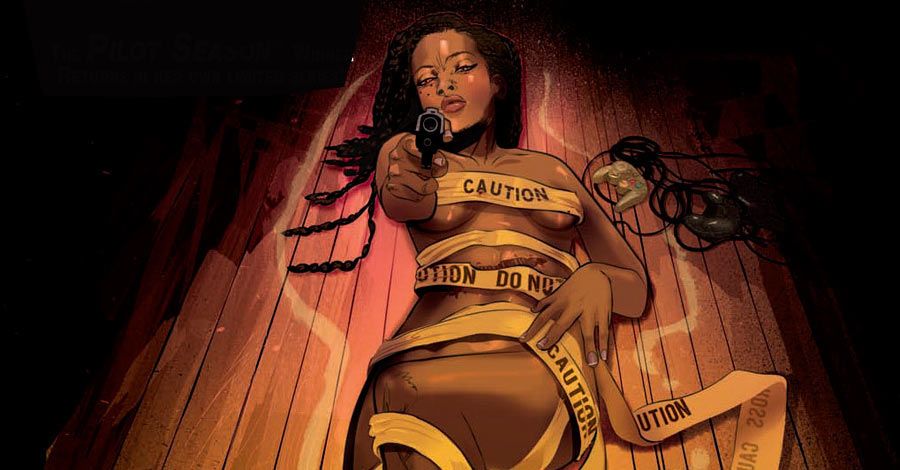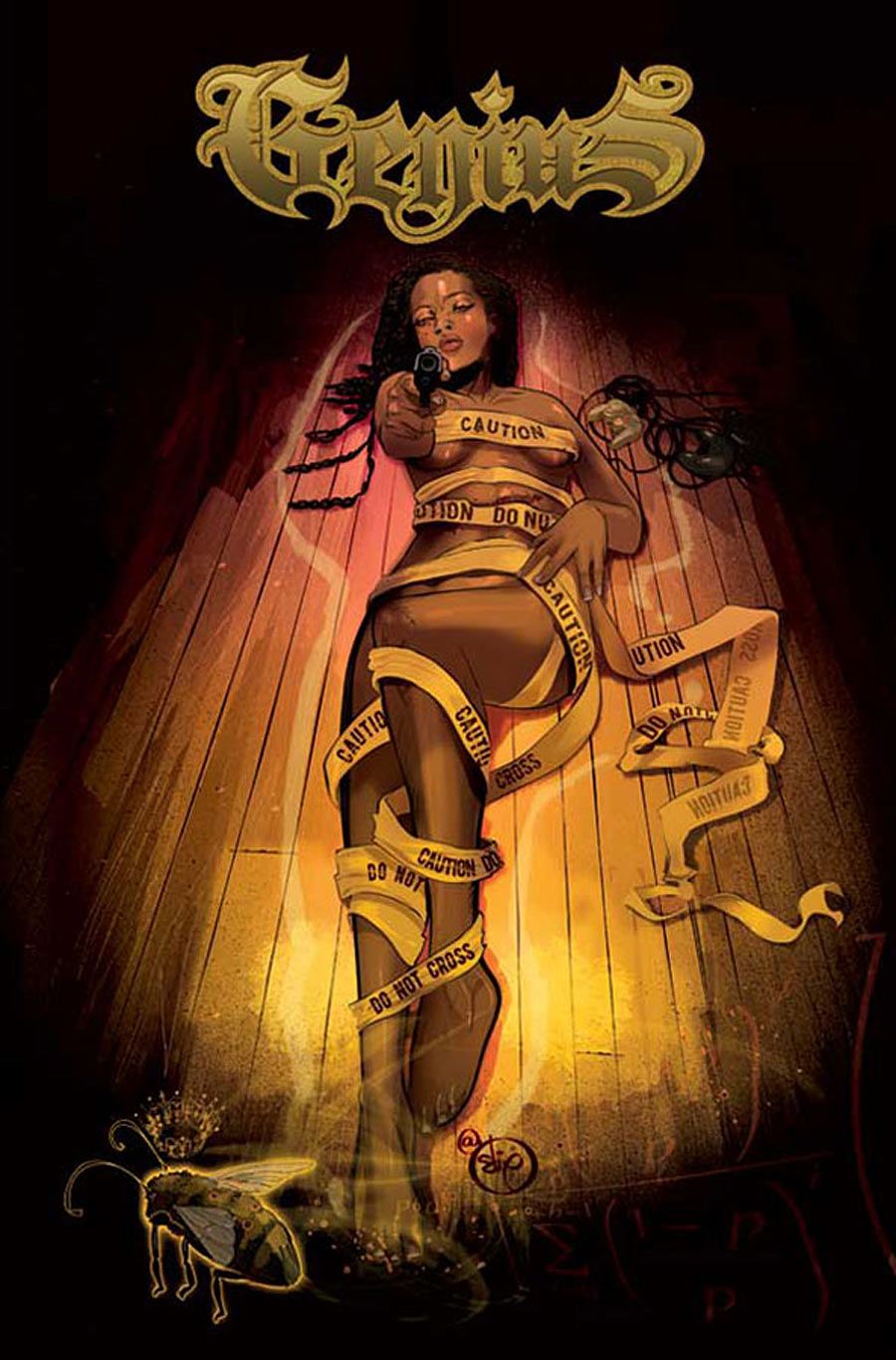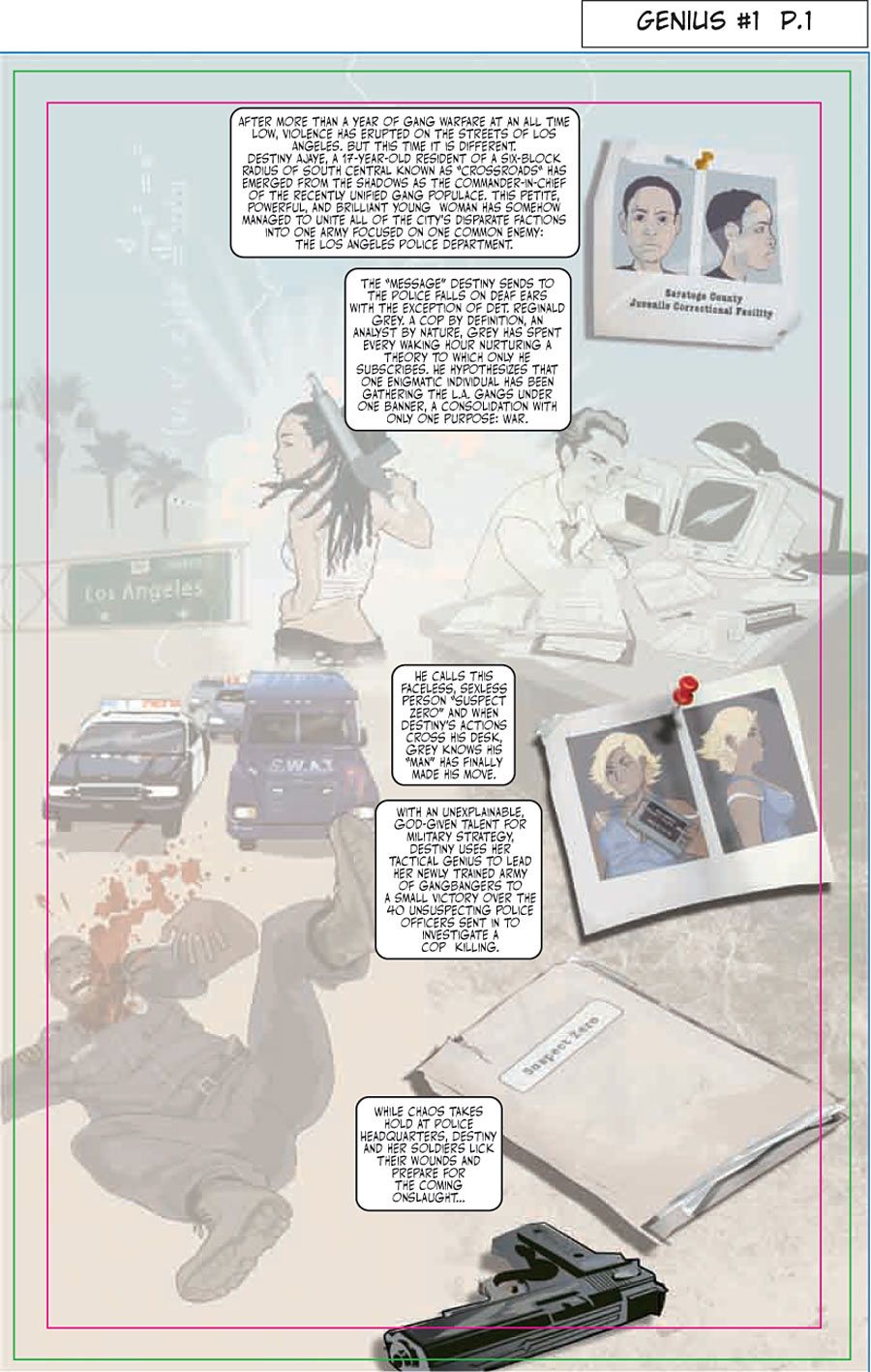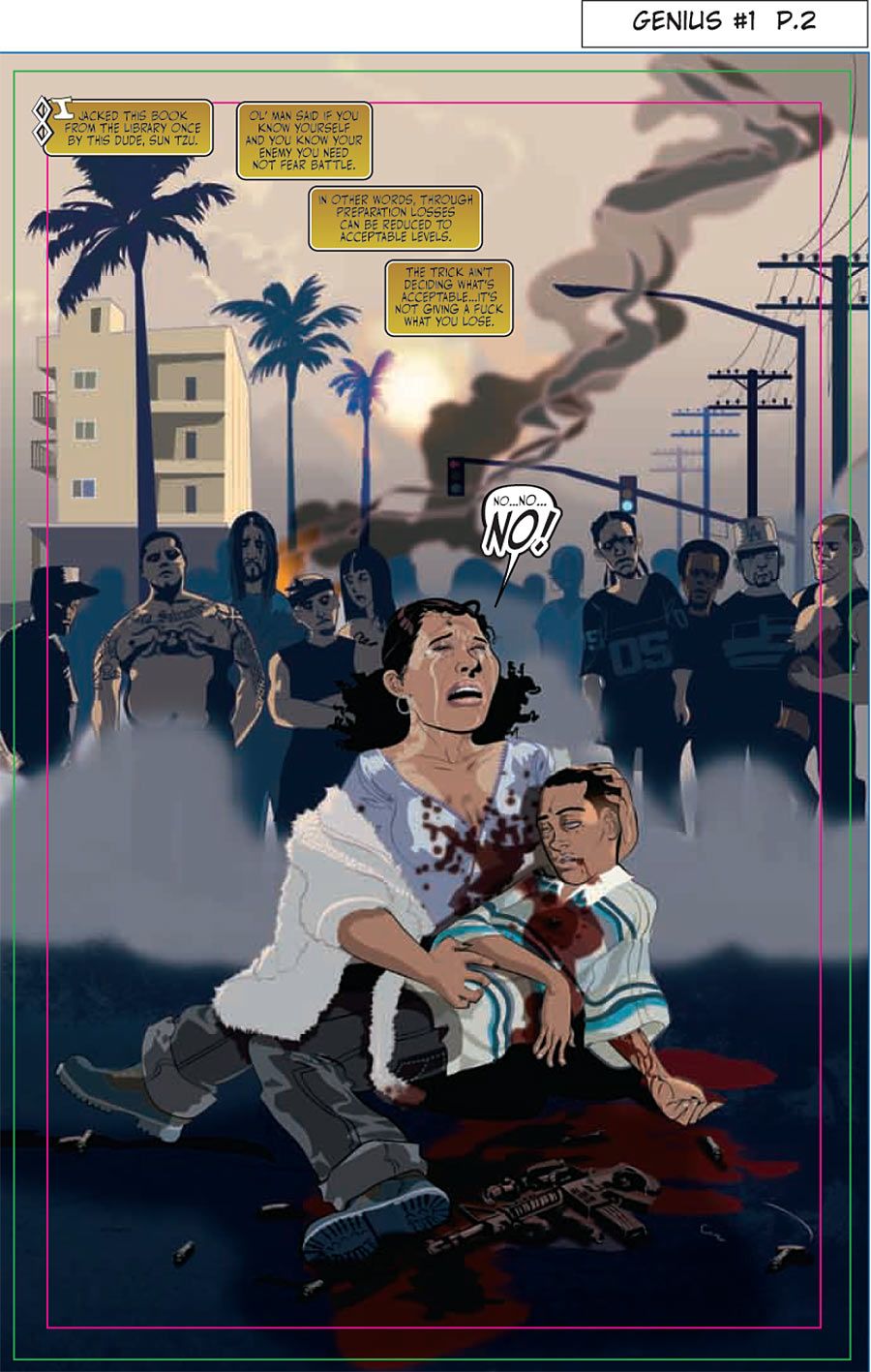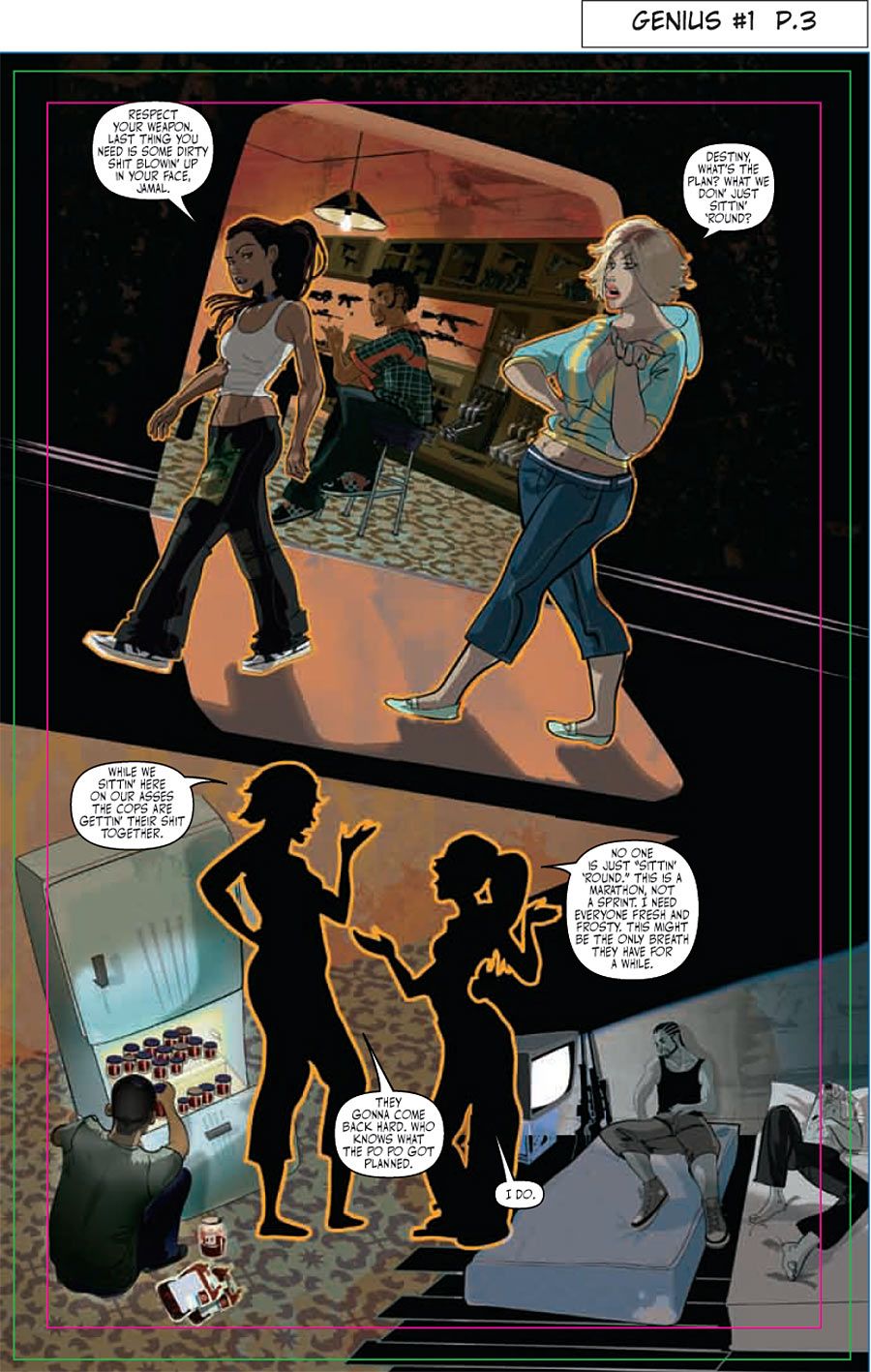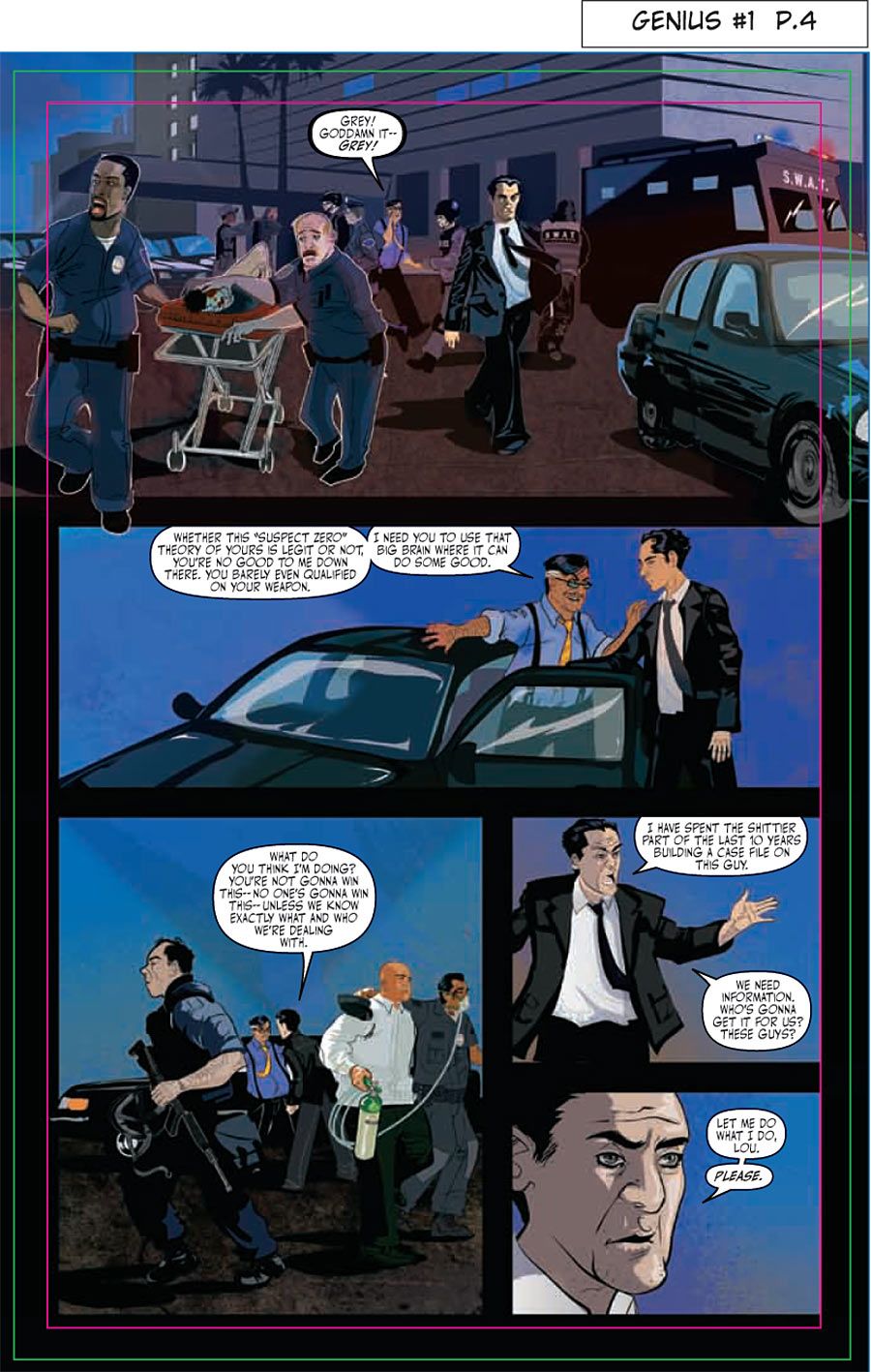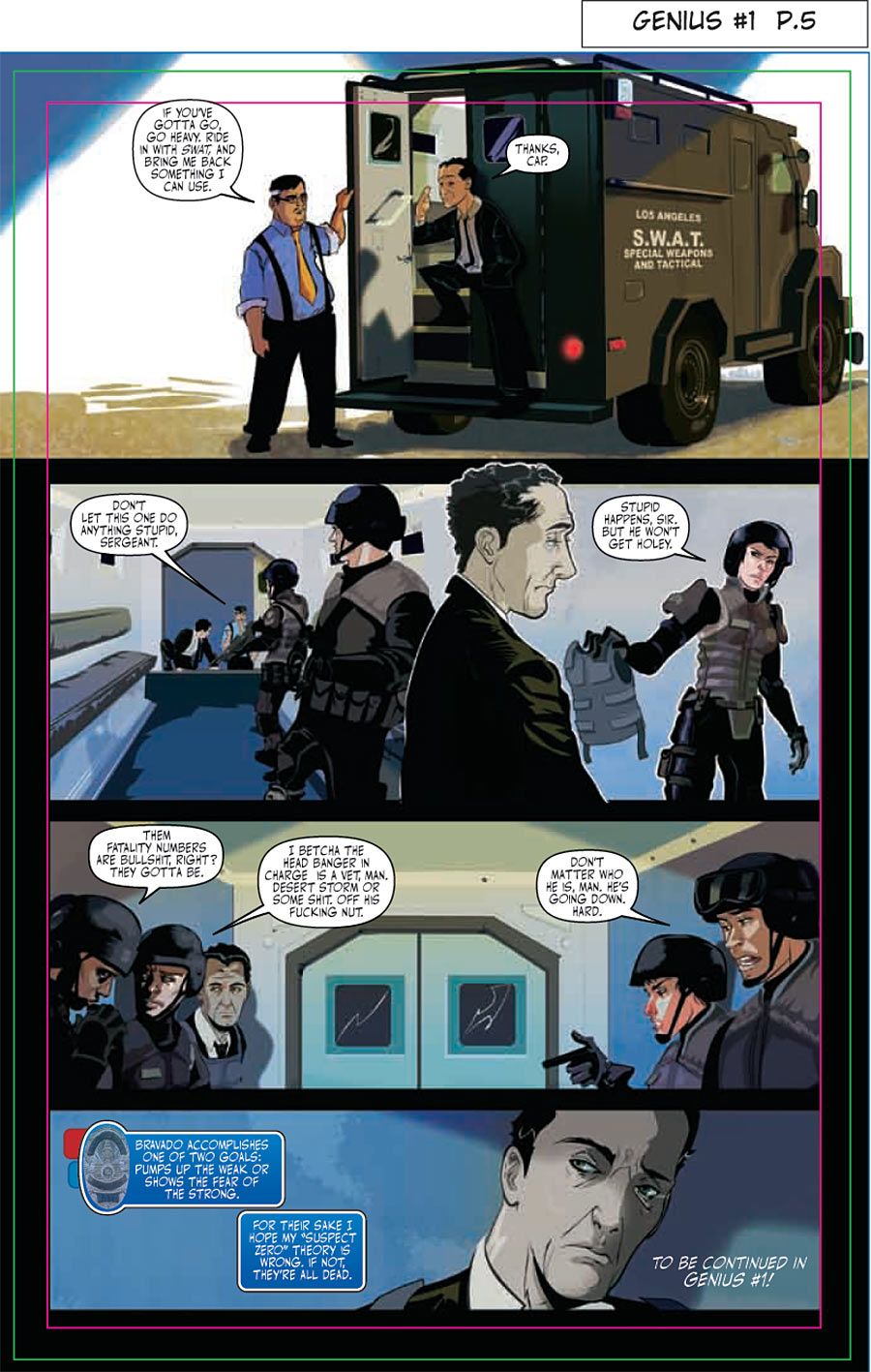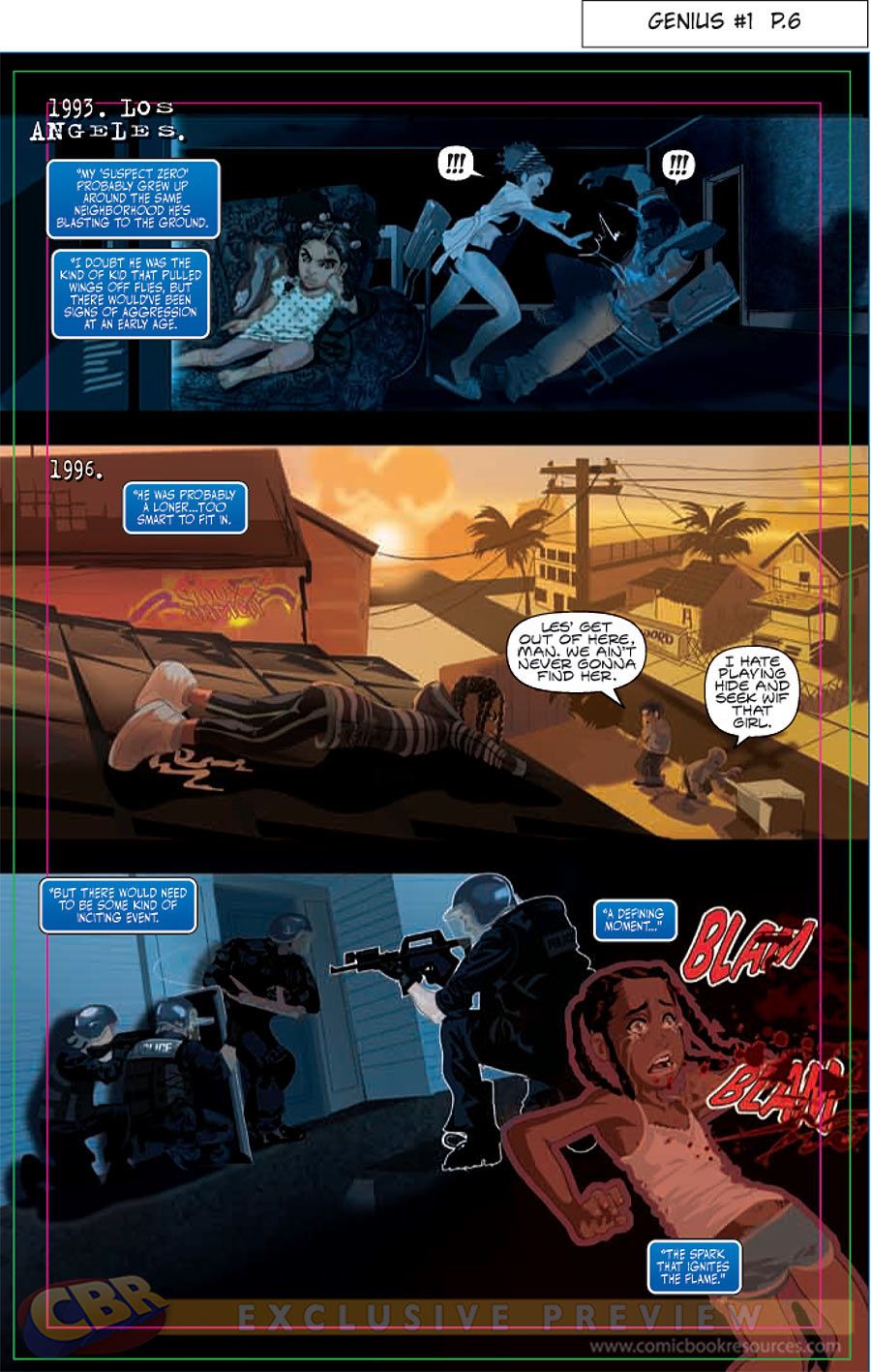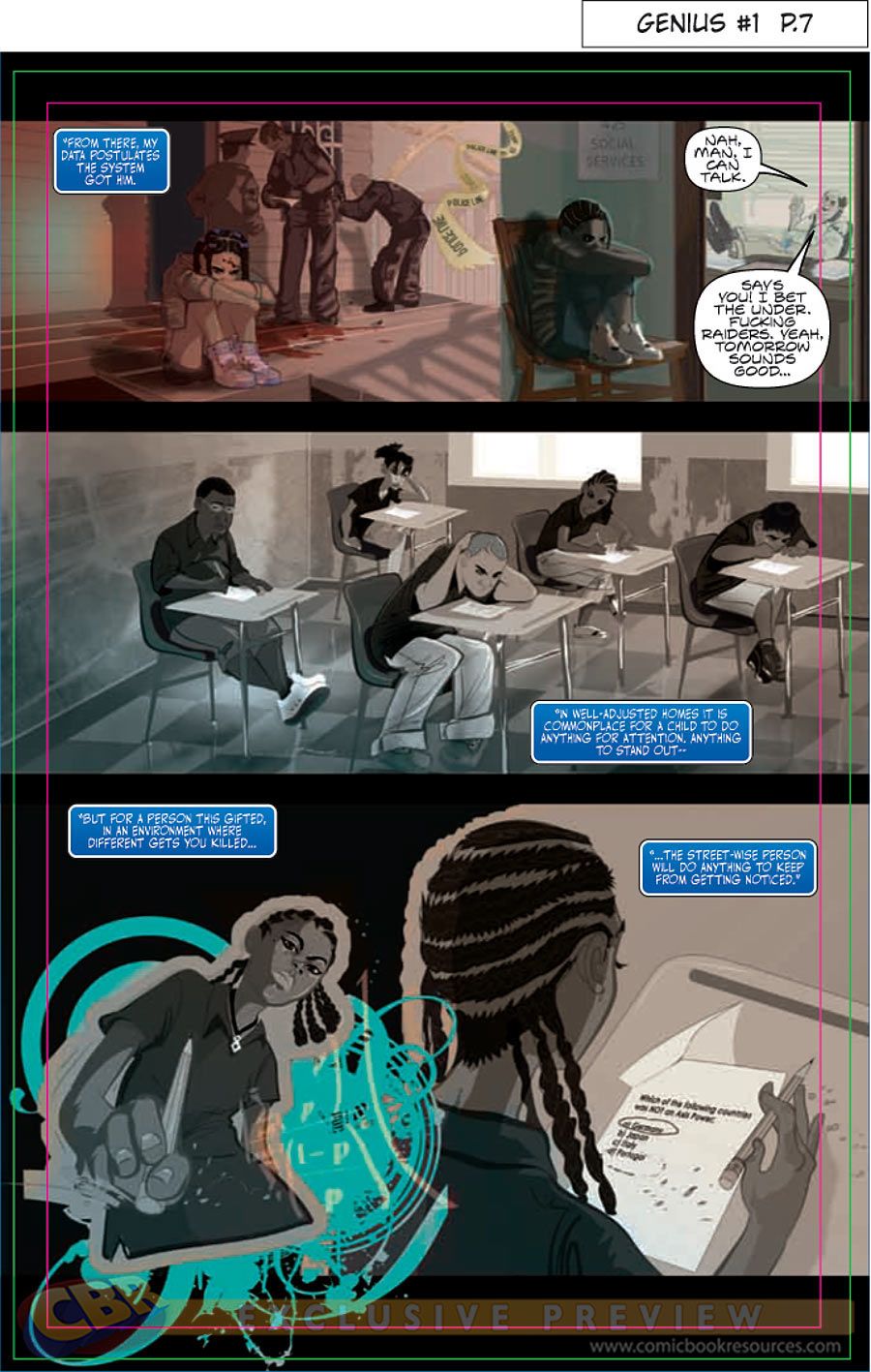In 2008, co-writers Marc Bernardin and Adam Freeman along with artist Afua Richardson commanded attention in Top Cow's second Pilot Season competition with their original work, "Genius." After being selected by fans as one of the winners, the series will formally debut from Top Cow's Minotaur Press imprint as a five-part miniseries shipping weekly this August.
"Genius" follows Destiny Ajaye, a military-minded teen savant growing up in South Central Los Angeles. In the midst of poverty and violence, Destiny sees hope. She sees a way to survive. Using her keen intellect and strategic insights, she unites various gangs and secedes three blocks of her neighborhood from the Union, holding her claim to demonstrate that she and the people of her community have more value than the world would allow them to believe.
Bernardin and Freeman spoke with CBR News to catch us up on what's been going on with "Genius" since in debuted in 2008 and filled us in on some more details about Destiny's world.
CBR News: It's been a while since the initial Pilot Season issue was out, so can you catch everyone up on the plot of "Genius?"
Marc Bernardin: The plot of Genius is relatively simple: What if there was a person who grew up in some of the harshest of harsh conditions America has to offer -- full of despair and death, hopelessness and loss -- and saw a way out of that socio-economic prison? And what if, thanks to a roll of the genetic dice, this person happened to be the finest military mind of her generation -- on the same level as Genghis Khan or Napoleon or Alexander the Great?
Adam Freeman: The way out she sees involves bullets and blood -- it involves seceding three-square blocks of Los Angeles from the Union by force.
Is this five-issue series a continuation of the 2008 Pilot Season you did as part of Top Cow's contest? If so, how does it relate to the original release, and why is it coming out now?
Freeman: It is a direct continuation. The moment we won Pilot Season we wrote the rest of what we consider the first arc of the series. As far as why it hasn't come out until now? Amazing question but that's above our pay grade.
Bernardin: The intervening years have been challenging for our creative team -- in both good and bad ways. Life got in the way, more often than not.
RELATED: Bernardin & Freeman Talk Top Cow's "Genius"
Has anything changed since the pilot in 2008 in terms of story, characters, etc?
Freeman: It still remains the story we always wanted to tell. Top Cow has been incredibly supportive creatively and really let us do what wanted.Ironically, the biggest change has been in the marketplace.
Bernardin: When we pitched this idea to publishers six years ago, it was the hardest sell in the world. No one wanted a book with a female lead. No one wanted a book with a black lead. A book with a black female lead was whatever the opposite of a unicorn is. Ebola, maybe. No one would touch "Genius" with a ten-foot pole. Except for Top Cow, which took a flier on the idea that, just maybe, there was an audience for a book like this. Today, publishers realize that there is a need for diversity in their titles. Some are far better at acting on that need, but that's just the nature of the beast. The audience has matured and gotten vocal. Maybe what at first seemed like an interminable delay will have actually been the best thing for "Genius."
The two of you have collaborated numerous times at this point -- what brought you together for this series? Is the process of a creator-owned work different from other things you've collaborated on in the past?
Freeman: We've been friends since 5th grade. 95% of the work we've done has been together so it's really kind of our "default" position. Occasionally opportunities arise for just one of us, but for the most part it is a great partnership.
Bernardin: Like what Adam said, it's not so much a matter of what brings us together to write; it's just a matter of finding the right story at the right time -- something that motivates both of us equally. The only real difference between creator-owned and work-for-hire, from a process perspective, is the number of editorial notes you get.
Freeman: We've done work for hire with established characters before. If you are a big name I imagine it's fun to add to the canon. But, alas, we are not big names so we get, "Have fun, be original, take chances... and don't do A, B, C or D." The continuity and back-stories can really handcuff you.
Bernardin: Not that all notes are a bad thing: A smart editor will make a story better, and we've been lucky to work with some great ones.
Freeman: I see what you did there. Yes, we've worked with some great editors.
How is the workload divided?
Freeman: I know in some partnerships someone does the plotting, someone does the dialogue, etc., but not in our case. Usually, one of us has the germ of the idea. Either Marc pitches it to me and I bite, or I pitch it to him and he tells me it's been done before. Once we both like the same idea we develop it together, outline it together and then one of us jumps in and writes the first 5 pages or so. We pass it off and the other person tweaks it, adds five more and so on. We used to write in the same room but we always spent more time playing X-Box or the guitar than writing so now we mostly work solo but while in constant contact.
Bernardin: It's a lot like a relay race. And when we're firing on all cylinders, we can write two different books at once, simply by bouncing the stories back and forth.
Freeman: When we're really firing we've done even more all at the same time. It keeps us fresh and always moving the ball forward.
Tell me a little bit about the main characters of "Genius."
Bernardin: The book is about Destiny Ajaye, the teenaged military savant of the title. She was raised in the heart of South Central, Los Angeles, to parents that were gunned down when she was a child. She learned to navigate the streets by herself and taught herself how to thrive. It has all led her to one place: putting a match to the powder keg that is life in the Hood.
There's Detective Reginald Grey, who's basically the Fox Mulder of the LAPD. For years he has been nursing this theory that a single person has been uniting the street gangs -- across territories and racial lines. Someone is building an army. He's been calling this person Suspect Zero -- but no one will listen to him. He's been laughed out of every meeting and barely tolerated by his superior officers. Until now.
Freeman: And there are Destiny's chief lieutenants: Gerald and Chavonne. Every field general is only as good as her information and Gerald is the tech wizard who acts as Destiny's eyes and ears along with operational support and communications. Chavonne is more like Destiny's staff sergeant: the person who makes sure the orders are carried out and kicks Destiny's soldiers into gear. They've both been friends with Destiny for years -- only they know the toll this war is exacting from her. And they are probably the only ones that know the real her.
Who are Destiny's supporters and who are her enemies? What is she fighting for?
Bernardin: She's drawing a line in the sand. She's making a statement in the most hard-to-ignore way possible. "This is not good enough." To her, change only comes through force -- especially if the people in control have nothing to gain from that change. And she wants to prove to her neighborhood that they are worth more than life would have them believe. They can make people notice. By putting aside their differences they can change the world. Their world, anyway.
Marc, you live on the East Coast, correct? Adam -- I'm not sure where you live, but I'm wondering how you each went about researching the climate of South Central L.A. What is your connection to the setting of "Genius" and Destiny's story?
Freeman: Marc lived on the east coast at time we wrote "Genius" but since then I managed to lure him out [to Los Angeles] with the promise of cookies and beer. Not in that order. In regards to "connection," there is no personal connection. It was really the best setting for the story. Actually that is incorrect: It is the story. We did tons of research on gangs, the neighborhood, the culture and so on.
Bernardin: What felt most important to us was to make sure that you understand who Destiny is and why she's doing what she's doing. Neither of us grew up poor and disenfranchised in South Central, but we both grew up wanting things we couldn't have -- that yearning feeling of there being something just outside your grasp. That, if you were willing to cross certain moral or legal boundaries, you could have it. Conveying that sense of futility, combined with agency, was more important to us than making sure we got some street names right.
That's not an area often known for having a lot of opportunities for young people -- what keeps Destiny motivated to see her talents through? How is she inspired and pushed by her surroundings?
Freeman: I think you hit on it -- the lack of opportunities is what motivates her. There are heroes and villains to every story and, what is the saying?"Every character is the hero of their own story?" This is told from the gang side. We could tell the same exact story from the law enforcement side and it would be totally different. She wants a better life. She may be misguided, or not using her talents in the most constructive way -- but in her world she is. Violence is all she has ever known so it is natural for her to assume change must come through violence.
Bernardin: Make no mistake, we are telling the story of a villain. And the thing of it is, I think Destiny is smart enough to know that she's the villain. Which is the real tragedy.
How did you connect with Afua on the art?
Bernardin: I had seen a story she did for Ivan Brandon's "24/7" anthology he put together for Image and was struck by her style. A little web research led us to her online portfolio and we were blown away. She was young and hungry and had an incredibly sleek but expressive Afro-Anime vibe. We pitched her to our then editor, Rob Levin, who felt the same way.
Do you have plans to continue the run beyond five issues?
Freeman: It is really up to the fans. There was so much positive reaction to the initial book, fans voted it the winner of Pilot Season, Warren Ellis endorsed it -- we were very fortunate. We just hope the time lapse hasn't dampened anyone's enthusiasm for the story. If they even remember it. Hopefully they do.
Bernardin: This miniseries ends the only way it could, but that doesn't mean there are no more stories to tell in this world. There are always more wars to fight.
Freeman: The end of this story gives you satisfying conclusion but also allows us to take to a lot of interesting places should we get that chance.
What else are you guys working on?
Freeman: After taking a self-imposed sabbatical from comics to work in TV and film we are really looking to get back into comics with a vengeance. We have two projects coming out with Lionforge, although I don't think they are announced yet. And of course we have several things in different stages of "development" at different companies. We are also hoping to make a big announcement regarding our Radical YA illustrated novel "Jake the Dreaming" very soon.
Bernardin: And we just reacquired the rights to our first graphic novel, "Monster Attack Network" -- we hope to be able to announce a new home for it, as well as more kaiju-happy stories, in the coming months.
"Genius" #1 goes on sale August 6 and will ship weekly throughout the month. Check out an exclusive extended preview of issue #1 right here on CBR.

